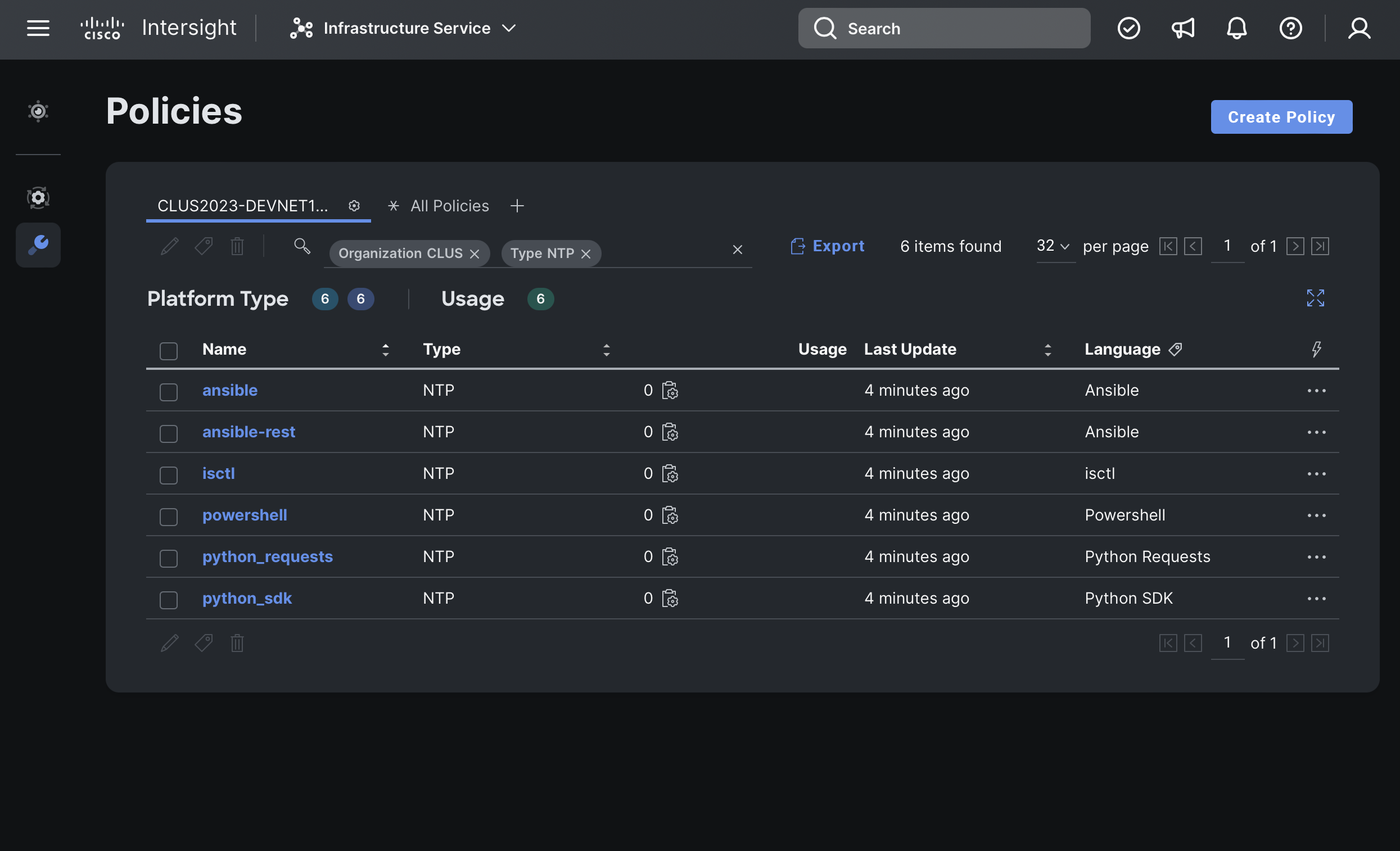This repo has example code used in DEVNET-1061 as delivered during Cisco Live US in 2023. The intention of this code is to provide a set of examples in various automation languages/tools that a new user of the Intersight API can reference to begin their journey.
It's perfectly reasonable to install the required prerequisites to execute this code on any unix-like system, such as Linux or macOS. I'd suggest building a Linux VM somewhere if you don't have one already. Either Red Hat Enterprise Linux (free for developers) or Ubuntu (always free) are well-supported choices. This can be done from Windows as well, although some of the scripting here expects a BASH-like shell.
https://registry.terraform.io/providers/CiscoDevNet/intersight/latest
https://docs.ansible.com/ansible/latest/collections/cisco/intersight/index.html
https://pypi.org/project/intersight/
https://pypi.org/project/intersight-auth/
https://www.powershellgallery.com/packages/Intersight.PowerShell/
https://github.com/cgascoig/isctl
Intersight uses an API key to sign the headers of API calls instead of using a username and password. The process for generating API keys is documented in many other places.
https://intersight.com/apidocs/introduction/security/#generating-api-keys
The API key comes in two parts…
The API key identifier is not secret, and in this repository we store this value in the key.id file.
The API key (sometimes called the private key) is a secret, and we store this in the key.pem file. It is indeed a PEM file and contains a cryptographic key that was issued by Intersight.
Non-functioning samples for both are provided in this repository. Once you download the files in this repository, please replace these two files with the API key that you have generated. If you do so, you may safely ignore the rest of the explanation of API Keys that is provided below, but you are welcome to continue if you are interested. This API key needs to be made available to the various languages/tools that we can use, and each one is somewhat different.
Regardless of which language/tool you use, you should not store the key.pem in plain text, as we have in this educational activity.
Terraform accesses the API keys via input variables. These could be passed in many ways, including the -var argument on the command line, from a .tfvars file, or from environment variables. The example in this repository will use environment variables. See the vars.sh file for the environment variables that start with TF_VAR_.
Ansible can access the API keys from environment variables or from a file. The example in this repository will use environment variables. See the vars.sh file for the environment variables that start with INTERSIGHT_API_.
The Python SDK always wants to read the API key from a file, but the API Key ID can come from anywhere. The example in this repository will use an environment variable to get the API Key ID (api_key_id = os.environ['INTERSIGHT_API_KEY_ID']) while the API key is read from a file (private_key_path=api_secret_file). The large block of if... elif in that section of code checks the private key to see which type is provided to set the cryptography parameters correctly.
The intersight-auth module for Requests can accept the API key either as a string or as a file. The example in this repository will use environment variables to get both. Again, see the vars.sh file.
api_key_id = os.environ['INTERSIGHT_API_KEY_ID']
api_key = os.environ['INTERSIGHT_API_PRIVATE_KEY']The PowerShell cmdlets for Intersight must be configured via a cmdlet. See configure_powershell.ps1 for the syntax. The example in this repository will use an environment variable to get the API Key ID (ApiKeyId = (Get-item -Path env:\INTERSIGHT_API_KEY_ID).Value) while the API key is read from a file (ApiKeyFilePath = "./key.pem").
Additionally, an interactive configuration can be performed from the command line by executing the Intersight-Configure cmdlet from within PowerShell.
The isctl configuration file is stored in ~/.isctl.yaml and configure_isctl.sh will automate that configuration in this repository. The API key ID will be stored in the YAML file, as will the file name of the API key. The API key will be accessed from the referenced file.
Additionally, the isctl executable has an interactive configuration that can be performed from the command line by executing isctl configure.
After surviving a long explanation of prerequisites and API keys, you are now ready to execute the examples provided by this repository. This will immediately fail if you don't have an Organization in Intersight named CLUS. Please go create it now. This ensures that the names of the NTP policies that this code will create cannot possibly conflict with any existing policy. If you are using a shared account that already has a CLUS organization… Maybe one of your peers beat you to this point!
If you've put your API keys in the right place, all you need to do is execute ntp_all.sh and it should start happening!
NTP Policies deployed from various languages/tools
